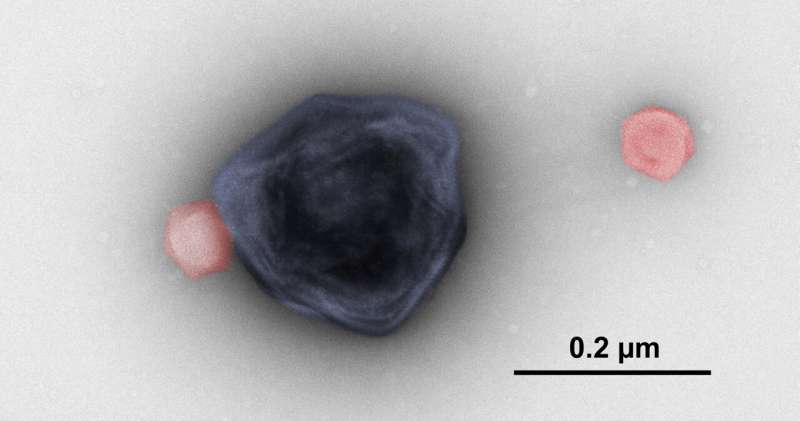This article has been reviewed according to Science X's editorial process and policies. Editors have highlighted the following attributes while ensuring the content's credibility:
fact-checked
peer-reviewed publication
trusted source
proofread
Researchers find some protists use beneficial viruses to fend off lytic viruses

Contrary to common belief, not all viruses are harmful to their hosts. Sometimes viruses can even protect their hosts from infection by other viruses. Scientists at the Max-Planck-Institute for Medical Research in Heidelberg and their collaborators have now demonstrated that this is the case for so-called endogenous virophages: small DNA viruses that are mostly found inserted into the genomes of single-cell eukaryotes—organisms whose cells have a membrane-bound nucleus. In addition, the scientists show that virophages are highly specific towards giant viruses, focusing on the CroV type in the present study.
In a new paper published in Proceedings of the National Academy of Sciences at the beginning of March, Anna Koslová, Matthias Fischer and colleagues from the Max-Planck-Institute for Medical Research and Thomas Hackl from the University of Groningen report that endogenous virophages in the marine zooplankter Cafeteria burkhardae are reactivated when their hosts encounter a giant virus. In their study, they analyzed reactivation towards the lytic giant virus CroV.
Host cells survive infection
The authors tested multiple zooplankton populations from around the globe and found virophage activity in the Atlantic and Pacific Oceans and in the Baltic Sea. Their analysis shows that all virophage responses were able to protect their host populations from CroV. Once released from the infected host cell, the virophage particles can stop the production of more giant viruses in the next round of infection—the population of host cells survives.
So far, virophage reactivation had been shown only for one engineered protist strain, and it remained unclear whether endogenous virophages from the environment could provide host protection against giant viruses.
Highly specific towards giant viruses
Interestingly, the authors found that virophages are highly specific towards their giant virus prey. Out of several different versions of endogenous virophages that are found embedded in the genomes of Cafeteria burkhardae, only one type reacted to the giant virus CroV. Other virophages may respond to different giant viruses yet to be discovered.
"Each virophage has apparently evolved to parasitize only one type of giant virus", says Matthias Fischer, who supervised the study. "Eukaryotes, in particular the single-celled ones, termed protists, carry in their genomes a collection of virophages that probably act as a defense arsenal. The more different virophages a cell has, the better may it be able to protect its neighbors against a variety of giant viruses. What we show here is probably just one of many examples where endogenous viruses can have beneficial effects for their hosts."
Starting signal for further research
Until recently, DNA viruses in protist genomes had been overlooked, mainly due to a lack of scientific studies dedicated to this diverse group of organisms, and because of technical limitations when analyzing their genomes. The level of detail with which Anna Koslová, in charge of lab work and analysis, and her colleagues studied the effect of virophages on virus-infected plankton cells is unprecedented.
Looking ahead, Matthias Fischer says, "By studying the roles of endogenous viruses in a variety of organisms, we are increasingly appreciating various positive aspects that viruses have on ecological and evolutionary processes. Our findings will undoubtedly inspire further research into beneficial effects of virus-host interactions."
More information: Anna Koslová et al, Endogenous virophages are active and mitigate giant virus infection in the marine protist Cafeteria burkhardae, Proceedings of the National Academy of Sciences (2024). DOI: 10.1073/pnas.2314606121
Journal information: Proceedings of the National Academy of Sciences
Provided by Max Planck Society




















